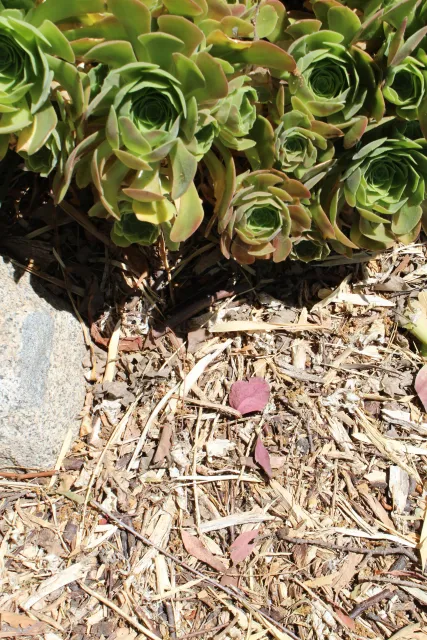This series provides answers to selected questions recently submitted to the UC Master Gardeners of Yolo County Help Desk.
Question: What is the best kind of mulch to use in our garden? Should I be concerned about using mulch that would make our soil too acidic?

Answer: When it comes to mulch material there are several choices. Which kind of mulch will work best for your garden depends on the size of the garden you plan to cover, and your preference in terms of cost, appearance, and characteristics of the mulch. Should you worry about a mulch making your soil too acidic? Read on ….If you’re planning on using mulch around trees and perennial plants, arborist wood chips are a great choice. They keep the soil cool and moist, keep weeds under control, and don’t decompose too quickly. While organic mulches, such as arborist wood chips or recycled green waste may contain pathogens, there is little evidence that the disease will spread to a new location in mulch form.
Arborist wood chips will often include not only wood but also ground-up pieces of bark, branches, and leaves, making for a biologically diverse mulch that resists compaction. There are several different kinds of wood chips used for mulching, including mixed green waste or arborist wood chips, mulch made from shipping pallets, and bark chip mulch. The quality will usually dictate the cost; however, in some cases you can get wood chips free from a local arborist or municipal arborist. No matter which mulch you decide to use, keep the material several inches away from the plant base or tree trunk, and try to spread organic mulch in a layer at least three to six inches deep.
If you’re looking for mulch options for your vegetable or flower garden, then wood chips would be a poor choice. They take forever to decompose, and therefore can’t be easily worked into the soil as an amendment. For vegetables and flowers, you’ll want to mulch with materials like straw, weathered sawdust, weed-free dried lawn clippings, dry leaves, or compost. Like their wood chip counterpart, these other materials also keep the soil moist and cool, and suppress weeds, but they have the added benefit of being easily removed when it is time to replant and they can be worked into the garden soil occasionally to improve the soil’s structure and general health. The best time to apply organic mulch is when warm weather sets in, which is in the late spring.
You may have heard weed-block fabric, and other similar material suggested as mulches, but these inorganic materials don’t offer the same soil-improving benefit of organic mulches. In fact, they deteriorate fairly quickly and become landscape waste that ends up in landfill. Some people may want to consider rock or stone in their gardens as mulch. These materials can be aesthetically pleasing, reduce evaporation and when applied properly, suppress weeds. However, they do not improve texture or add nutrients to soil, and in the Sacramento Valley, will become quite hot in summer. When smaller stones or gravel are used, plan to love it forever because it is very difficult to remove.
Which brings us to the last question: should you be concerned about a mulch making your soil too acidic? While some mulches can be slightly acidic, that acidity is restricted to the mulch layer itself, and will have little to no effect on the overall pH of the soil underneath.
For more information refer to UC ANR’s publication – Mulches for Landscapes
This article previously appeared in the Winters Express and Davis Enterprise.
If you have a gardening question, contact the UC Master Gardener Help Desk at 530-666-8737. Or send an email, with information regarding watering, sun exposure, details about your problem, and photos when possible.

